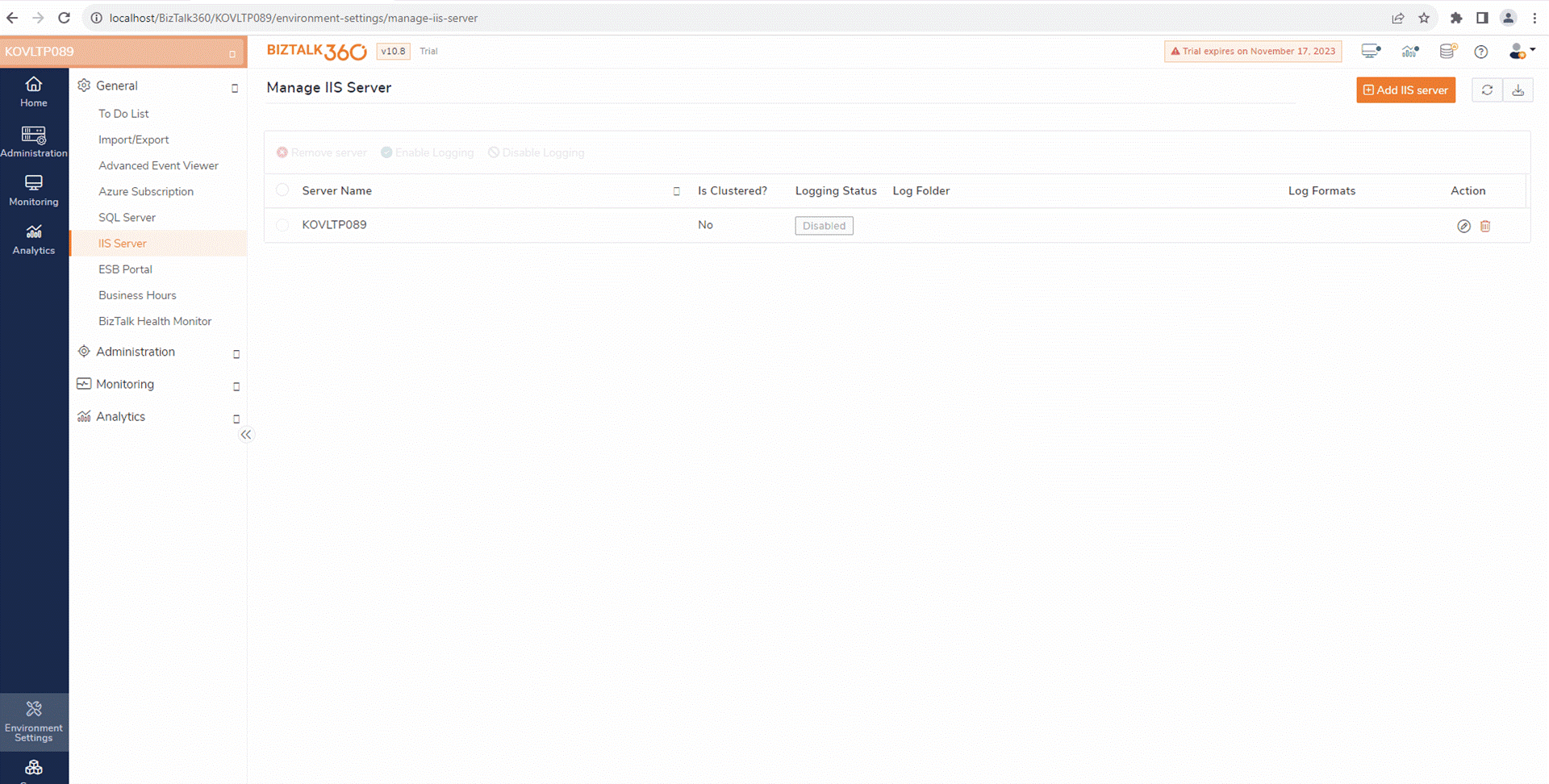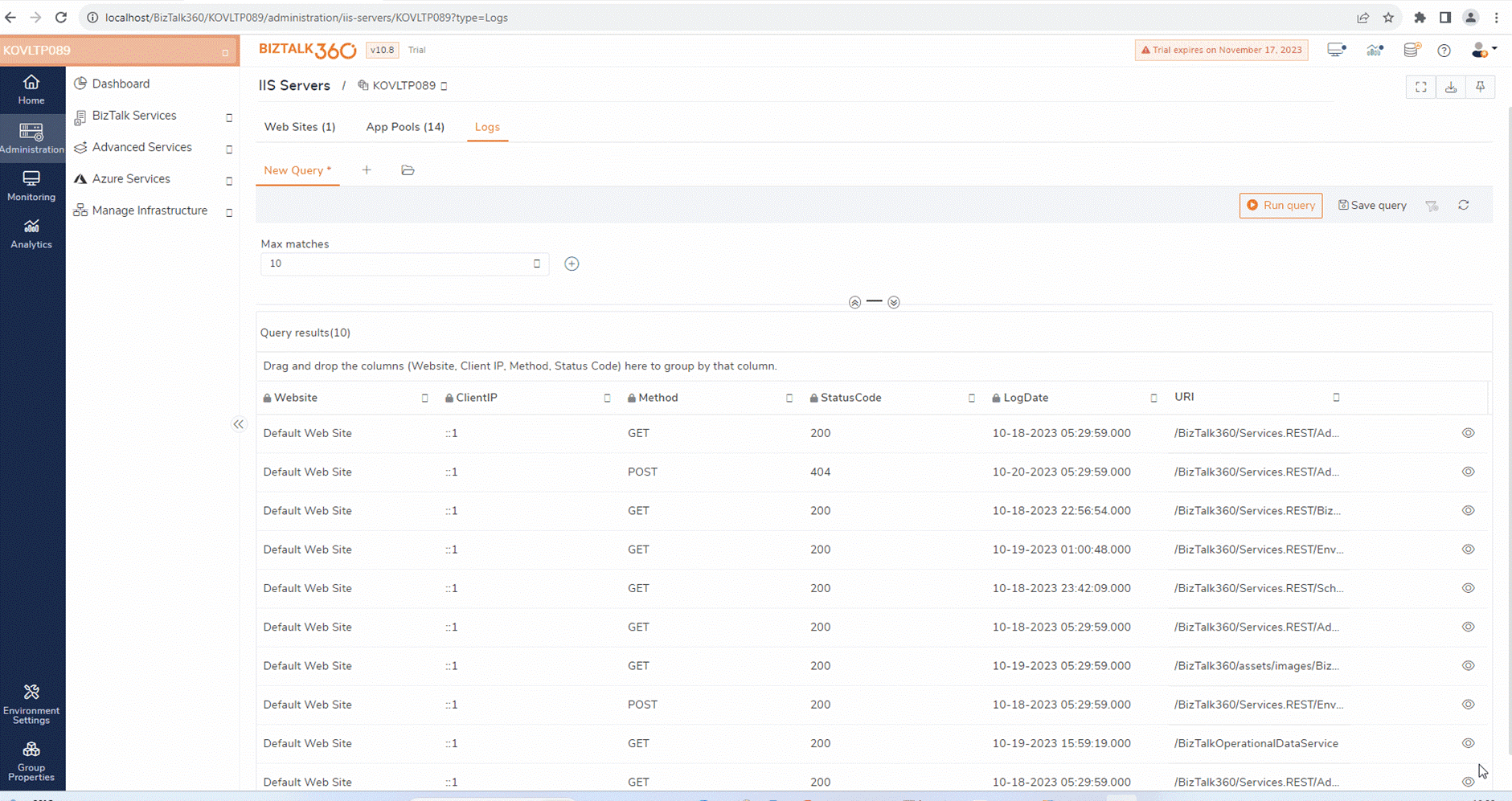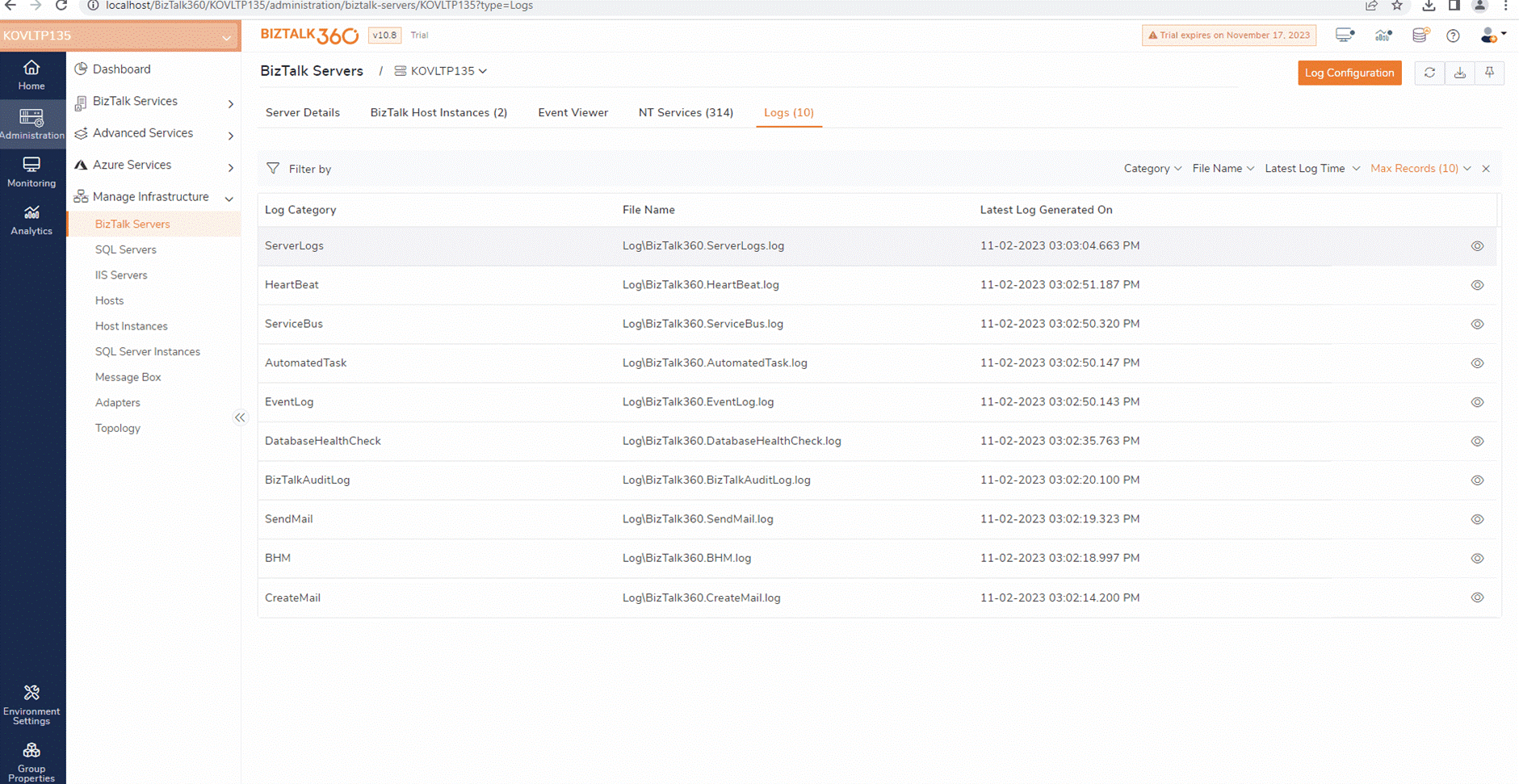BizTalk360 is focused on optimizing the monitoring and managing of the critical components in the BizTalk Environment. It simplifies the task by consolidating all essential functionalities into one centralized location, eliminating the need to switch between multiple servers. In the latest release v10.8, we support viewing the logs from BizTalk360 for further enhance its support for managing BizTalk and IIS Server components. Log viewers are handy for backtracking the events in IIS and BizTalk Servers. Log files can provide valuable information about the functionality and health of your IIS and BizTalk systems.
For those unfamiliar with IIS logs, these are files generated by the IIS web server, that is recording and detailed information about requests and server activity. These logs serve several usages and are valuable for various aspects of web server management, performance analysis, and troubleshooting.
IIS generates individual log files for each hosted website, and users have the flexibility to define the log file location through the “Logging” section of the respective website settings. In instances where IIS operates as a service on a Windows server, the default directory for storing these log files will be %SystemDrive%\inetpub\logs\LogFiles. In most cases, %SystemDrive% corresponds to the C:\ drive on the server.

IIS provides versatile logging choices, enabling users to select from various log formats. Similar to configuring the log file location, users can designate the log file format for a website hosted on IIS within the “Logging” settings. It’s important to note that regardless of the chosen format, all logs are consistently recorded in ASCII text.
| Type | Default | Custom fields | Separator | Time format | Compatible with FTP |
|---|---|---|---|---|---|
| W3C | Yes | Yes | Space | UTC | Yes |
| ISS | No | No | Comma | Local Time | |
| NCSA | No | No | Space | Local Time | No |
Imagine a large enterprise that heavily relies on BizTalk Server for orchestrating and managing complex integration processes between various systems and applications. The development and operations teams often face challenges in debugging issues and gaining insights into application-level issues within the BizTalk environment. Traditional methods of debugging may be time-consuming, and there is a need for a centralized solution that provides valuable debugging information and application insights.
BizTalk360 has introduced a new feature, the IIS log viewer, to meet the identified business requirements. This enhancement builds upon the platform’s existing capabilities in managing IIS websites and application pools, aiming to streamline the debugging process and provide valuable insights into application-level issues. With this addition, BizTalk360 users can now efficiently access and analyze IIS logs through the platform’s unified interface, further enhancing their ability to troubleshoot.
Consider a scenario where customers submit orders through the company’s website, and the order data is forwarded to the BizTalk Server for processing. The implementation involves configuring the BizTalk Server with an HTTP/SOAP adapter to handle incoming order requests. When a customer places an order, the order information is transmitted to a designated HTTP endpoint exposed by the HTTP/SOAP adapter in BizTalk.
In the above case, effectively utilizing IIS logs becomes crucial for monitoring incoming HTTP requests to the specified endpoint managed by the HTTP/SOAP adapter in BizTalk. This analysis becomes a valuable tool for the IT team, enabling them to monitor the frequency and patterns of incoming orders and gain insights into the system’s demand. The ability to identify sudden spikes or unusual patterns in order submissions aids in maintaining a robust order processing system.
Despite this, manually tracking and searching for specific HTTP requests can be tedious, involving the manual inspection of multiple log files for collecting relevant information.
BizTalk360 could collect the IIS logs from the configured folder path where the log files are available in a server and allow the users to view IIS logs directly within its user interface. This simplifies the log management process, reducing the need to switch between multiple servers.
IIS logging configuration can be enabled upon logging into BizTalk360 and selecting the specific environment; you can activate the IIS logging option and include the log path configured in IIS by navigating to environment settings and selecting the IIS Server option.

BizTalk360 is designed to gather IIS logs that adhere to formats like W3C, NCSA, and IIS but not the Custom format. The collection process is further refined based on predefined file name patterns that outline the criteria for identifying new log files.
| Format | Criterion for New Logs | Filename pattern |
| Microsoft IIS Log Format | By file size | inetsvnn.log |
| Hourly | inyymmddhh.log | |
| Daily | inyymmdd.log | |
| Weekly | inyymmww.log | |
| Monthly | inyymmww.log | |
| NCSA Common Log File Format | By file size | ncsann.log |
| Hourly | ncyymmddhh.log | |
| Daily | ncyymmdd.log | |
| Weekly | ncyymmww.log | |
| Monthly | ncyymm.log | |
| W3C Extended Log File Format | By file size | extendnn.log |
| Hourly | exyymmddhh.log | |
| Daily | exyymmdd.log | |
| Weekly | exyymmww.log | |
| Monthly | exyymm.log |



Accessing the IIS logs from BizTalk360, rather than from the IIS servers has several advantages in terms of accessibility. Let’s have a look at several of these advantages.

BizTalk Server handles multiple business transactions, and BizTalk360 can effectively manage and monitor these BizTalk Server environments. When errors or critical issues arise, you would typically need to switch between different servers to access logs and troubleshoot. However, with BizTalk360, you can conveniently access these logs through its user-friendly interface, eliminating the need to switch between servers. This centralized access simplifies the process of monitoring and resolving issues within your BizTalk environment.

Use Case: Consider a scenario where multiple transactions are happening between multiple servers, increasing the possibility of message breakdown or messages failing to reach their destination server.
To resolve these issues, the administrator would typically need to switch to each server and access their respective log files, which can be time-consuming. With the BizTalk Server log viewer in BizTalk360, administrators can quickly identify problems that need to be addressed.
To enable the log configuration, navigate to “Manage Infrastructure -> BizTalk Server -> Logs” and select the respective server.
Select “Log Configuration” and within the configuration blade, activate the “Logging Status”. Next, specify the log4net directory path for BizTalk log files. Multiple file paths can be added, allowing you to access and view the logs from multiple files. Once logging is turned on, all relevant logs will be listed along with their category, Filename and Timestamp

To view a log file in detail, click on the eye icon, which opens the log file details blade. In this blade, you can view all the logs in detail along with its generated time and file name.

Additional options are available in the Log Details blade, allowing you to download logs and view the latest generated logs highlighted by clicking the ‘Goto Latest’ button. When dealing with extensive logs, the ‘word wrap’ option can be enabled to present the logs in a readable format.

With robust filtering capabilities, you can filter logs based on specific criteria, including Log category and Timestamp for date-time filtering. Consider a scenario where continuous transactions result in message failures due to an underlying issue. In such situations, the team must promptly address and resolve the problem. By leveraging the filtering options based on Log category and logged time, this functionality empowers the team to precisely pinpoint and access highly relevant logs to their troubleshooting needs. This targeted approach facilitates efficient issue resolution by allowing the team to focus specifically on the logs associated with the failed transactions during the identified time frames.

When your environment holds a large volume of Log data this can impact the performance of the BizTalk environment. Over time the server logs databases can become unwieldy, and it may affect query performance. To prevent this from happening, in BizTalk360 you can schedule the purging for 15 days. By periodically purging the log files, you keep the databases healthy and maintain the performance.
User access policies for BizTalk and IIS logs can play a critical role in ensuring the security, compliance, and effective operation of these systems. Access permissions will be assigned based on a few roles, with different levels of access as necessary.
Let’s consider the scenario of an organization where messages frequently get dropped due to server problems.
In this case, the user can make use of the logs in BizTalk360, where the information for this issue will get logged in the respective server to which they have access. By doing this check, users can easily act on critical issues and improve the performance and smooth transactions within the organization.
In a real-world scenario, large enterprises will mostly have multiple BizTalk environments with one or more BizTalk applications. BizTalk360 allows users to specify their preferred time zone for displaying data.
Within BizTalk360, the collected logs will be displayed with accurate time zone conversion even when BizTalk360 and the BizTalk/IIS servers operate in different time zones.
BizTalk360, the one-stop tool for managing your BizTalk environments, allowing you monitor, manage, and troubleshoot issues all within a single platform, saving you time and enabling quick action.